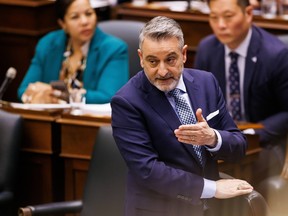Education
Ontario Education Minister Proposes Changes to School Trustees

Ontario’s Education Minister, Paul Calandra, recently announced a controversial proposal that could significantly alter the role of school trustees across the province. In remarks made to a CBC reporter at the Association of Municipalities of Ontario conference in Ottawa, Calandra suggested that the ministry “needs to step up to the plate more so than it has over the last 40 years” and indicated a potential move to eliminate the province’s English-language school board trustees.
These locally elected officials are responsible for setting educational policy, overseeing budgets, and serving as a vital link between parents and schools. Calandra criticized the current governance structure, stating, “We have to stop downloading responsibility to trustees who neither have the authority to tax or the expertise to undertake some of the things that we’re asking them to do.” His press secretary, Emma Testani, further emphasized in an email that “all options, including changes to governance and the role of elected trustees, are on the table.”
Premier Doug Ford echoed these sentiments, highlighting a perceived ineffectiveness among school boards and suggesting that public sentiment is shifting against trustees, whom he characterized as inefficient in managing funds.
While it is easy to point fingers at school boards, the Ottawa-Carleton District School Board (OCDSB) has faced its share of controversies. Trustee Donna Blackburn acknowledged that the board has struggled with dysfunction in the past. Instances such as her own censure in 2020 for racially insensitive remarks and the censure of former trustee Dr. Nili Kaplan-Myrth in 2022 illustrate ongoing governance challenges. Recent resignations from board members Kaplan-Myrth and Justine Bell have also raised alarms about the board’s internal dynamics.
Despite these issues, criticisms of trustees do not justify the province’s proposed actions. Calandra’s assertion that trustees lack financial authority is particularly noteworthy given that it was the provincial government under Mike Harris in 1998 that removed such powers from trustees, amalgamating them into larger districts and taking complete financial control.
The government claims that it is investing in education, yet the Canadian Centre for Policy Alternatives argues otherwise, estimating a shortfall of $6.3 billion in funding since 2018. This has resulted in a loss of nearly 5,000 classroom educators, severely impacting student support, especially in regions like Ottawa, where funding per student has decreased by approximately $560.
The province’s response to financial deficits in school boards has involved appointing supervisors to oversee five boards, including the OCDSB, citing consecutive deficits. Trustee Lyra Evans noted that the OCDSB’s deficits had included planned shortfalls as a response to the COVID-19 pandemic. She attributed recent unplanned deficits to the fallout from Bill 124, which was ruled unconstitutional, leading to substantial retroactive compensation costs that depleted the board’s reserves.
An investigation by PricewaterhouseCoopers found no evidence of reckless financial management within the OCDSB, and the board had passed a balanced budget for the current year before the province intervened. Evans pointed out that deficits are not isolated to Ottawa; many boards across Ontario are experiencing similar issues, often resulting from rising costs that exceed the funding provided by the government.
The implications of changing the governance structure extend beyond finances. Proposed legislation known as Bill 33, the Supporting Children and Students Act, could empower the minister to investigate and potentially take control of school boards for reasons deemed to be in the “public interest.” This could lead to increased provincial oversight and reduced local autonomy, raising concerns among stakeholders about the effectiveness and transparency of educational governance.
Academics like Sachin Maharaj from the University of Ottawa warn that eliminating school boards can lead to increased bureaucracy and decreased responsiveness to community needs. He cited the experience in Nova Scotia, where the removal of English-language school boards led to significant dissatisfaction among parents and a lack of noticeable improvement in student outcomes.
The president of the Canadian School Boards Association, Alan Campbell, described Ontario’s direction as an alarming strategy to undermine a democratic institution that operates independently of provincial pressures. He emphasized that even those without children in schools should be concerned about how educational governance is shaped.
As discussions around the future of school trustees continue, it remains essential to recognize their role as advocates for families and communities. Eliminating these positions may not address the underlying issues facing Ontario’s education system. Instead, restoring the powers that were taken away could foster a more effective and accountable governance structure, ensuring that local voices are heard in the decision-making processes that shape education in the province.
Email: [email protected]
-

 Lifestyle2 weeks ago
Lifestyle2 weeks agoChampions Crowned in Local Golf and Baseball Tournaments
-

 Science3 weeks ago
Science3 weeks agoMicrosoft Confirms U.S. Law Overrules Canadian Data Sovereignty
-

 Education2 weeks ago
Education2 weeks agoRed River College Launches New Programs to Address Industry Needs
-

 Technology2 weeks ago
Technology2 weeks agoDragon Ball: Sparking! Zero Launching on Switch and Switch 2 This November
-

 Technology3 weeks ago
Technology3 weeks agoWorld of Warcraft Players Buzz Over 19-Quest Bee Challenge
-

 Technology3 weeks ago
Technology3 weeks agoGoogle Pixel 10 Pro Fold Specs Unveiled Ahead of Launch
-

 Science2 weeks ago
Science2 weeks agoChina’s Wukong Spacesuit Sets New Standard for AI in Space
-

 Science3 weeks ago
Science3 weeks agoXi Labs Innovates with New AI Operating System Set for 2025 Launch
-

 Science3 weeks ago
Science3 weeks agoTech Innovator Amandipp Singh Transforms Hiring for Disabled
-

 Technology3 weeks ago
Technology3 weeks agoNew IDR01 Smart Ring Offers Advanced Sports Tracking for $169
-

 Technology3 weeks ago
Technology3 weeks agoGlobal Launch of Ragnarok M: Classic Set for September 3, 2025
-

 Technology3 weeks ago
Technology3 weeks agoFuture Entertainment Launches DDoD with Gameplay Trailer Showcase
-

 Health2 weeks ago
Health2 weeks agoB.C. Review Urges Changes in Rare-Disease Drug Funding System
-

 Technology3 weeks ago
Technology3 weeks agoHumanoid Robots Compete in Hilarious Debut Games in Beijing
-

 Technology3 weeks ago
Technology3 weeks agoInnovative 140W GaN Travel Adapter Combines Power and Convenience
-

 Science3 weeks ago
Science3 weeks agoNew Precision Approach to Treating Depression Tailors Care to Patients
-

 Business3 weeks ago
Business3 weeks agoNew Estimates Reveal ChatGPT-5 Energy Use Could Soar
-

 Health2 weeks ago
Health2 weeks agoRideau LRT Station Closed Following Fatal Cardiac Incident
-

 Health3 weeks ago
Health3 weeks agoGiant Boba and Unique Treats Take Center Stage at Ottawa’s Newest Bubble Tea Shop
-

 Science3 weeks ago
Science3 weeks agoNew Study Reveals Surprising Impact of Gratitude on Helping Behaviors
-

 Technology3 weeks ago
Technology3 weeks agoDiscover the Relaxing Charm of Tiny Bookshop: A Cozy Gaming Escape
-

 Technology3 weeks ago
Technology3 weeks agoBorderlands 4 Promises Massive Changes with 30 Billion Guns
-

 Technology3 weeks ago
Technology3 weeks agoQuoted Tech Launches Back-to-School Discounts on PCs
-

 Lifestyle2 weeks ago
Lifestyle2 weeks agoVancouver’s Mini Mini Market Showcases Young Creatives










